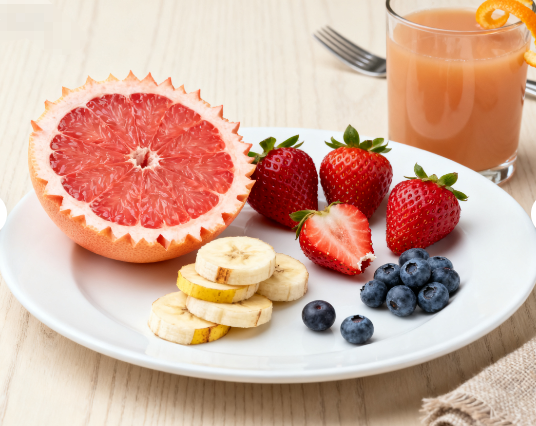
Eating This Common Fruit Every Morning Might Be Damaging Your Health—Here’s What You Need to Know
Margaret, 68, has started her day the same way for a decade: oatmeal, black coffee, and half a grapefruit. “My doctor said it’s healthy—low calories, high vitamin C,” she says. But last year, a routine blood test showed dangerously high potassium levels. “When I mentioned grapefruit, my doctor raised an eyebrow,” she recalls. “That ‘healthy’ fruit was messing with my meds—and my heart.”
If you’re over 50 and reach for morning fruit, you likely think you’re making a smart choice. Fruits are packed with fiber, vitamins, and antioxidants—but one popular option quietly harms many older adults. It’s not exotic (dragon fruit) or “too sweet” (mangoes). It’s the humble grapefruit—and if you take certain meds or have health issues, daily morning grapefruit could do more harm than good.
Let’s keep the science simple: Grapefruit has furanocoumarins, compounds that disrupt your liver’s enzyme CYP3A4. This enzyme breaks down meds so your body uses (or eliminates) them. Blocking it makes meds build up in your blood—sometimes to dangerous levels.
You might think, “No meds = safe grapefruit?” Maybe, but age brings other risks. Grapefruit is high in potassium, great for most, but if you have kidney problems (common over 60), your kidneys can’t filter excess potassium. This causes hyperkalemia, leading to irregular heartbeats, muscle weakness, or heart failure. Margaret had undiagnosed early kidney disease—grapefruit pushed her potassium over the edge.
Then there’s acidity. Grapefruit irritates the stomach and esophagus. If you have GERD (affecting 20% of Americans, more common with age), morning grapefruit triggers heartburn, chest pain, or a sour taste. “I loved grapefruit for breakfast, but had burning by 10 a.m.,” says Tom, 72. “My wife suggested skipping it—heartburn vanished. I couldn’t believe it.”
To be clear: Grapefruit is nutritious for healthy people. The problem is older adults often don’t know they’re high-risk. Here’s who needs caution:
If you take these meds, avoid grapefruit (or talk to your doctor):
- Cholesterol drugs: Statins like atorvastatin (Lipitor) or simvastatin (Zocor) (top-prescribed for over 50s). Grapefruit raises risk of muscle pain, weakness, or rhabdomyolysis (rare but serious muscle breakdown).
- Blood pressure meds: Calcium channel blockers like amlodipine (Norvasc). Grapefruit makes them stronger, causing dangerously low blood pressure, dizziness, fainting, or falls (a big concern for older adults).
- Heart rhythm meds: Drugs like amiodarone (Pacerone). Grapefruit boosts blood levels, increasing nausea, vomiting, or severe heart issues.
- Immunosuppressants: Post-transplant meds like cyclosporine (Neoral). Grapefruit buildup leads to kidney damage or high blood pressure.
- Some antidepressants: SSRIs like sertraline (Zoloft). Grapefruit raises side effects: drowsiness, confusion, or life-threatening serotonin syndrome.
Dozens more meds (allergy, painkillers) interact with grapefruit—and most people don’t know. A 2022 Journal of the American Geriatrics Society study found 30% of over-65s take at least one interacting med, but only half get warnings. “I ate grapefruit daily with cholesterol meds—my doctor never mentioned it,” says Linda, 70. “I asked after a TV story. He said, ‘Oh, stop eating that.’ I was shocked.”
Why the gap? Doctors are busy; pharmacists catch interactions better—but only if you share your diet. “People list meds, not daily grapefruit,” says Boston pharmacist Sarah Lee. “I always ask about grapefruit, Seville oranges, pomelos. If someone’s on a statin and says yes, I explain risks immediately.”
No meds, no kidney/GERD issues? Grapefruit is fine—in moderation. A half daily is okay for healthy adults, but a whole every morning is too much. “Fruit has natural sugar,” says UCLA nutritionist Dr. James Wilson. “As we age, metabolism slows; too much fruit causes weight gain or blood sugar spikes, especially with prediabetes (affecting 1 in 3 over 50s).”
Better morning fruit options:
- Apples: High fiber (aids digestion, keeps you full), low sugar, no med interactions. Easy to grab—perfect for busy mornings.
- Berries: Blueberries, strawberries, raspberries—packed with antioxidants (fight inflammation, protect the brain) and fiber. Low potassium (kidney-safe) and gentle on the stomach (great for GERD). Add to oatmeal, yogurt, or eat plain.
- Bananas: Good potassium boost (not too much) and vitamin B6 (supports brain function). If on potassium-lowering meds (like diuretics), ask your doctor how many are safe.
- Peaches/pears: Sweet, juicy, low acid (stomach-friendly). High fiber and vitamin C—full of morning nutrients.
Love grapefruit and don’t want to quit? Talk to your doctor/pharmacist first. “It’s not always ‘no,’” Dr. Wilson says. “We might adjust your dose or switch meds. For example, pravastatin (Pravachol) is a statin that doesn’t interact with grapefruit—great if you love it but take Lipitor.”
Eating grapefruit later in the day doesn’t help—furanocoumarins stay in your system 72 hours, so lunchtime grapefruit still affects morning meds. Only safety is avoiding it or working with your provider.
Margaret stopped eating grapefruit, and her potassium and heart rhythm normalized. “I missed the tang, but now I have half an apple with oatmeal,” she says. “No more fatigue—small change, big difference.”
Tom switched to blueberries: “I put them in yogurt—no heartburn. My grandkids love them too—now it’s a tradition.”
The takeaway: “One-size-fits-all” nutrition fails as we age. What’s healthy for 30-year-olds isn’t for 70-year-olds on meds. Stay aware of your body, meds, and diet—talk to your provider about concerns.
Next time you grab morning fruit, ask: “Is this right for me?” If it’s grapefruit and you’re over 50, on meds, or have kidney/stomach issues—try something new. Your body (and heart) will thank you.
Healthy eating isn’t about rules—it’s finding what works for you. Sometimes, that means swapping your favorite fruit for something just as tasty, but safer.